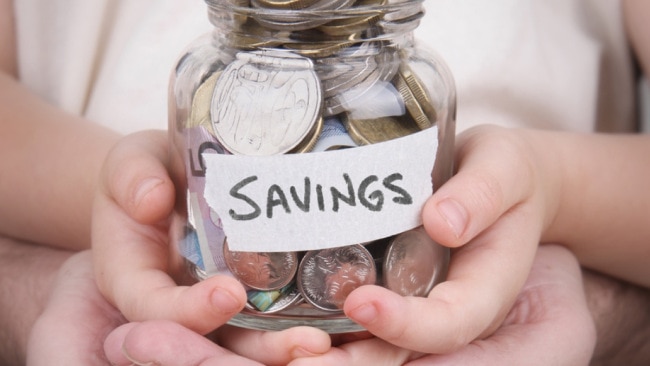Five ways to help your kids save money
SAVING money is a skill you can start teaching your children from a very young age.

SAVING money is a skill you can start teaching your children from a very young age.
But parents shouldn’t take for granted that this is a life skill - like learning how to use a knife and fork or crossing the street safely - that children need to be taught.
Most experts say the best thing parents can do is to practise what you preach. Studies have found that kids who grow up in households where the parents have poor money habits are likely to grow up and make the same mistakes.
Giving your kids a good foundation and teaching them about money matters is critical for their personal development. Showing children the basics such as how to budget, spend and save will establish good money habits for life, according to ASIC’s MoneySmart website.
Talk to them from an early age about where money comes from, how everything has a cost and how money is earned not just magically dispensed from an ATM. As they grow older, and the maths they learn is more sophisticated, you can teach them the magic of compound interest and how, borrowing money can be very costly.
But to start, go back to basics …
- Piggy banks
Money boxes or piggy banks are a fun way for children to start learning about money and to encourage saving. Try to find one that you can open (but not too easily) so they can take the money out and count it regularly to see if their savings are going up or down.
Talk to them about their savings plans. Are they saving for something they want? And if the savings go down discuss how that happened and ways to boost it once again.
- Coin sorting
In our increasingly cashless society make coins king. Whether it is in jars, bowls or even tin cans, collecting coins and sorting them into different denominations is a great way to practise counting and to improve recognition of these pieces of legal tender from a young age.
Matthew Deeble, Director of Evidence for Learning and Practice Lead, Education
says encouraging maths is key.
“One thing we do know from evidence is that basic numeracy and numerical concepts are foundational to building financial literacy skills,” he says.
As they get older, consider other ways to sort the coins. You might decide that all the gold coins will be saved towards a holiday and all the silver coins will be given to charity. When on that holiday, for example, you can talk about how you were able to buy theme park tickets because you saved the gold coins.
- Needs v wants
Saving is a crucial skill for kids to learn but, they will all have to spend at some stage so teaching them to distinguish between what is needed and what is wanted is an important lesson. Dr Rakesh Gupta, senior lecturer, Griffith University Business School says modelling good spending practises for your children is essential.
“Let your child see that you do not spend money that you do not have,” Dr Gupta says. “Just because you have a credit card does not mean you should exhaust your credit limit.”
If you need something for the family, such as a new fridge, show them how you save to pay for it rather than borrowing to pay for it. And if they want the latest model laptop explain that, while it would be a great item to have, their existing laptop is still working well and they will have to save up to buy a new one if they want it that badly.
Building better controls over needs and wants can be built from a young age says Deeble.
“Do you want it or need it? Can you wait and be given more later - that could be foods or desserts or, trips to places where kids want to go. That can teach children how to self-regulate,” he says.
- Give them a goal
Dr Gupta says it is important not to make money the end goal.
“Make sure your child sees money as part of a transaction: it is a resource that you have but it is not everything that you have — it is not your whole life,” he says.
Whether it is that latest model laptop, a new toy or a scooter – choosing an item to save for can be a great motivator.
- Avoid waste
Food charity OzHarvest estimates more than half of all food waste comes from the home. On average, Australian households waste over $3,800 each year on food that is never eaten.
Building that correlation between money, the value of goods and how you choose how to spend the money you earn can be started early on by setting up pocket money.
Setting jobs for pocket money and talking about where kids will save or spend their money makes the value of all items more relevant, says Deeble.
“It’s about making it explicit. Building a personal budget, such as pocket money, allows you to talk about what are you saving for and what are you going to spend at the shops this weekend and making them see that these are decisions that parents have to make every day.”
Originally published as Five ways to help your kids save money



